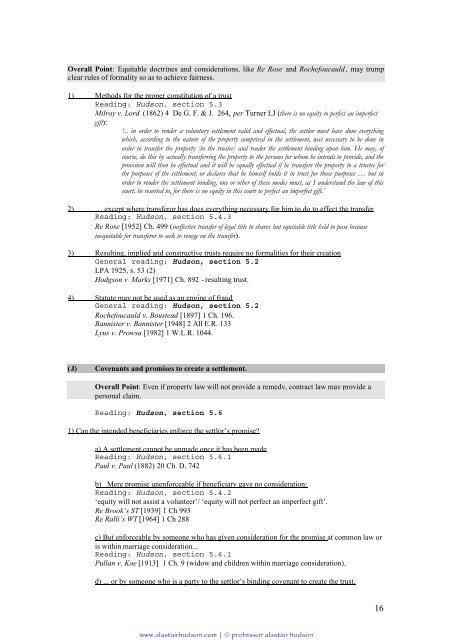Advanced Equity and Trusts Law - alastairhudson.com
Advanced Equity and Trusts Law - alastairhudson.com
Advanced Equity and Trusts Law - alastairhudson.com
Create successful ePaper yourself
Turn your PDF publications into a flip-book with our unique Google optimized e-Paper software.
Overall Point: Equitable doctrines <strong>and</strong> considerations, like Re Rose <strong>and</strong> Rochefoucauld , may trump<br />
clear rules of formality so as to achieve fairness.<br />
1) Methods for the proper constitution of a trust<br />
Reading: Hudson, section 5.3<br />
Milroy v. Lord (1862) 4 De G. F. & J. 264, per Turner LJ (there is no equity to perfect an imperfect<br />
gift):<br />
‘... in order to render a voluntary settlement valid <strong>and</strong> effectual, the settlor must have done everything<br />
which, according to the nature of the property <strong>com</strong>prised in the settlement, was necessary to be done in<br />
order to transfer the property [to the trustee] <strong>and</strong> render the settlement binding upon him. He may, of<br />
course, do this by actually transferring the property to the persons for whom he intends to provide, <strong>and</strong> the<br />
provision will then be effectual <strong>and</strong> it will be equally effectual if he transfers the property to a trustee for<br />
the purposes of the settlement, or declares that he himself holds it in trust for those purposes … but in<br />
order to render the settlement binding, one or other of these modes must, as I underst<strong>and</strong> the law of this<br />
court, be resorted to, for there is no equity in this court to perfect an imperfect gift.’<br />
2) … except where transferor has does everything necessary for him to do to effect the transfer<br />
Reading: Hudson, section 5.4.3<br />
Re Rose [1952] Ch. 499 (ineffective transfer of legal title to shares but equitable title held to pass because<br />
inequitable for transferor to seek to renege on the transfer).<br />
3) Resulting, implied <strong>and</strong> constructive trusts require no formalities for their creation<br />
General reading: Hudson, section 5.2<br />
LPA 1925, s. 53 (2)<br />
Hodgson v. Marks [1971] Ch. 892 - resulting trust.<br />
4) Statute may not be used as an engine of fraud<br />
General reading: Hudson, section 5.2<br />
Rochefoucauld v. Boustead [1897] 1 Ch. 196.<br />
Bannister v. Bannister [1948] 2 All E.R. 133<br />
Lyus v. Prowsa [1982] 1 W.L.R. 1044.<br />
(J) Covenants <strong>and</strong> promises to create a settlement.<br />
Overall Point: Even if property law will not provide a remedy, contract law may provide a<br />
personal claim.<br />
Reading: Hudson, section 5.6<br />
1) Can the intended beneficiaries enforce the settlor’s promise?<br />
a) A settlement cannot be unmade once it has been made<br />
Reading: Hudson, section 5.6.1<br />
Paul v. Paul (1882) 20 Ch. D. 742<br />
b) Mere promise unenforceable if beneficiary gave no consideration:<br />
Reading: Hudson, section 5.4.2<br />
‘equity will not assist a volunteer’/ ‘equity will not perfect an imperfect gift’.<br />
Re Brook’s ST [1939] 1 Ch 993<br />
Re Ralli’s WT [1964] 1 Ch 288<br />
c) But enforceable by someone who has given consideration for the promise at <strong>com</strong>mon law or<br />
is within marriage consideration...<br />
Reading: Hudson, section 5.6.1<br />
Pullan v. Koe [1913] 1 Ch. 9 (widow <strong>and</strong> children within marriage consideration).<br />
d) ... or by someone who is a party to the settlor’s binding covenant to create the trust.<br />
www.<strong>alastairhudson</strong>.<strong>com</strong> | © professor alastair hudson<br />
16













